Human Rights Act, 1998: Impact on Parliamentary Sovereignty Analysis
VerifiedAdded on 2020/04/29
|6
|1403
|113
Essay
AI Summary
This essay provides a comprehensive analysis of the Human Rights Act 1998 and its impact on Parliamentary Sovereignty in the United Kingdom. It begins by introducing the Act and its implementation of the European Convention on Human Rights (ECHR) within UK law, highlighting the resulting changes to constitutional law. The essay then delves into the interplay between the Act and the principle of Parliamentary Sovereignty, which grants Parliament supreme law-making power. It examines how sections 3 and 4 of the Act provide courts with the power to interpret legislation consistently with ECHR rights and issue declarations of incompatibility. The essay explores key case law, including R v A (No. 2) and Ghaidan v Godin-Mendoza, to illustrate the courts' application of these sections and the limits of their interpretive powers. Ultimately, the essay argues that the Human Rights Act, despite granting new powers to the judiciary, does not undermine Parliamentary Sovereignty, as Parliament retains the ability to enact legislation, even if incompatible with the ECHR, and the Act itself can be repealed. The essay concludes that Parliamentary Sovereignty remains intact, emphasizing the supremacy of Parliament as the ultimate law-making body.

Paraphrase This Document
Need a fresh take? Get an instant paraphrase of this document with our AI Paraphraser
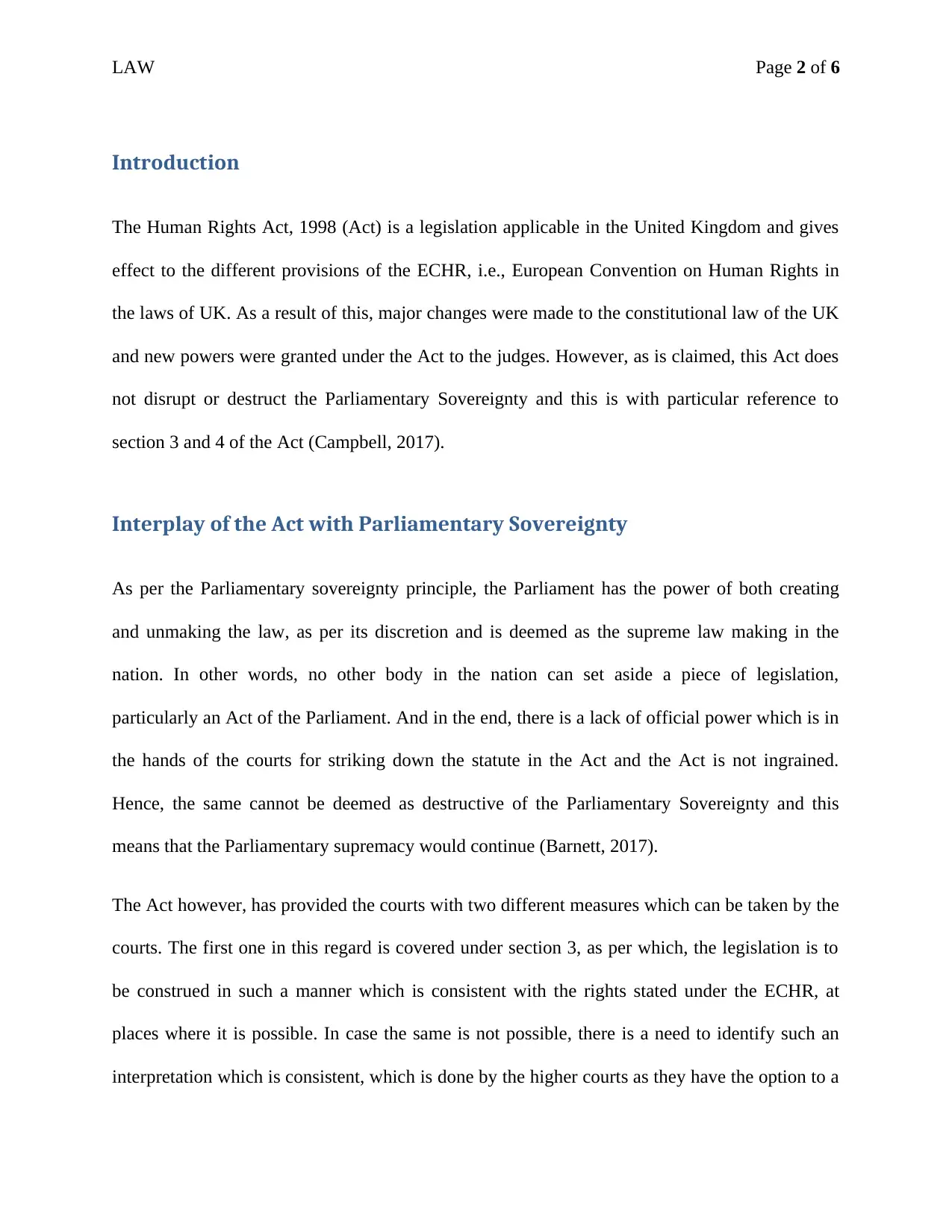
LAW Page 2 of 6
Introduction
The Human Rights Act, 1998 (Act) is a legislation applicable in the United Kingdom and gives
effect to the different provisions of the ECHR, i.e., European Convention on Human Rights in
the laws of UK. As a result of this, major changes were made to the constitutional law of the UK
and new powers were granted under the Act to the judges. However, as is claimed, this Act does
not disrupt or destruct the Parliamentary Sovereignty and this is with particular reference to
section 3 and 4 of the Act (Campbell, 2017).
Interplay of the Act with Parliamentary Sovereignty
As per the Parliamentary sovereignty principle, the Parliament has the power of both creating
and unmaking the law, as per its discretion and is deemed as the supreme law making in the
nation. In other words, no other body in the nation can set aside a piece of legislation,
particularly an Act of the Parliament. And in the end, there is a lack of official power which is in
the hands of the courts for striking down the statute in the Act and the Act is not ingrained.
Hence, the same cannot be deemed as destructive of the Parliamentary Sovereignty and this
means that the Parliamentary supremacy would continue (Barnett, 2017).
The Act however, has provided the courts with two different measures which can be taken by the
courts. The first one in this regard is covered under section 3, as per which, the legislation is to
be construed in such a manner which is consistent with the rights stated under the ECHR, at
places where it is possible. In case the same is not possible, there is a need to identify such an
interpretation which is consistent, which is done by the higher courts as they have the option to a
Introduction
The Human Rights Act, 1998 (Act) is a legislation applicable in the United Kingdom and gives
effect to the different provisions of the ECHR, i.e., European Convention on Human Rights in
the laws of UK. As a result of this, major changes were made to the constitutional law of the UK
and new powers were granted under the Act to the judges. However, as is claimed, this Act does
not disrupt or destruct the Parliamentary Sovereignty and this is with particular reference to
section 3 and 4 of the Act (Campbell, 2017).
Interplay of the Act with Parliamentary Sovereignty
As per the Parliamentary sovereignty principle, the Parliament has the power of both creating
and unmaking the law, as per its discretion and is deemed as the supreme law making in the
nation. In other words, no other body in the nation can set aside a piece of legislation,
particularly an Act of the Parliament. And in the end, there is a lack of official power which is in
the hands of the courts for striking down the statute in the Act and the Act is not ingrained.
Hence, the same cannot be deemed as destructive of the Parliamentary Sovereignty and this
means that the Parliamentary supremacy would continue (Barnett, 2017).
The Act however, has provided the courts with two different measures which can be taken by the
courts. The first one in this regard is covered under section 3, as per which, the legislation is to
be construed in such a manner which is consistent with the rights stated under the ECHR, at
places where it is possible. In case the same is not possible, there is a need to identify such an
interpretation which is consistent, which is done by the higher courts as they have the option to a
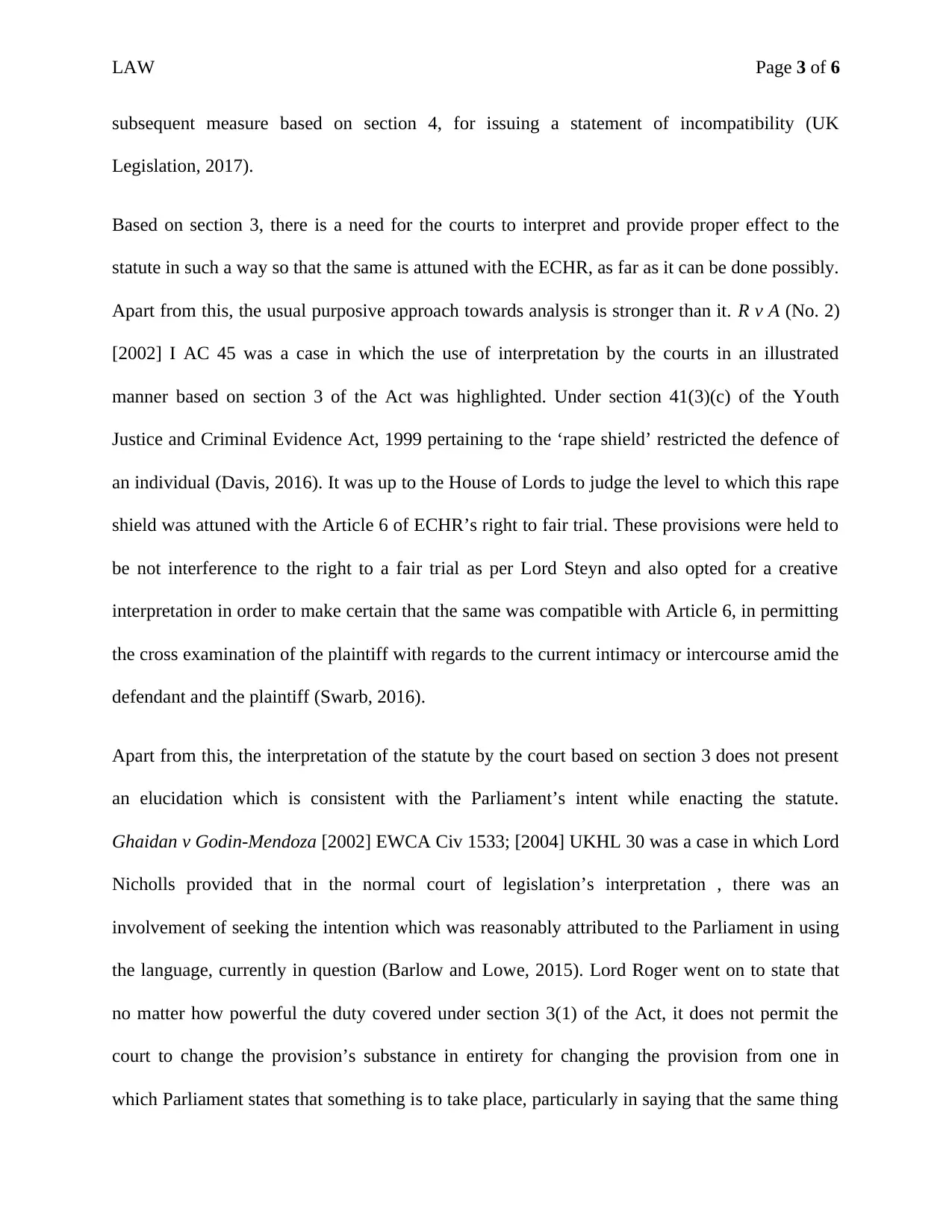
LAW Page 3 of 6
subsequent measure based on section 4, for issuing a statement of incompatibility (UK
Legislation, 2017).
Based on section 3, there is a need for the courts to interpret and provide proper effect to the
statute in such a way so that the same is attuned with the ECHR, as far as it can be done possibly.
Apart from this, the usual purposive approach towards analysis is stronger than it. R v A (No. 2)
[2002] I AC 45 was a case in which the use of interpretation by the courts in an illustrated
manner based on section 3 of the Act was highlighted. Under section 41(3)(c) of the Youth
Justice and Criminal Evidence Act, 1999 pertaining to the ‘rape shield’ restricted the defence of
an individual (Davis, 2016). It was up to the House of Lords to judge the level to which this rape
shield was attuned with the Article 6 of ECHR’s right to fair trial. These provisions were held to
be not interference to the right to a fair trial as per Lord Steyn and also opted for a creative
interpretation in order to make certain that the same was compatible with Article 6, in permitting
the cross examination of the plaintiff with regards to the current intimacy or intercourse amid the
defendant and the plaintiff (Swarb, 2016).
Apart from this, the interpretation of the statute by the court based on section 3 does not present
an elucidation which is consistent with the Parliament’s intent while enacting the statute.
Ghaidan v Godin-Mendoza [2002] EWCA Civ 1533; [2004] UKHL 30 was a case in which Lord
Nicholls provided that in the normal court of legislation’s interpretation , there was an
involvement of seeking the intention which was reasonably attributed to the Parliament in using
the language, currently in question (Barlow and Lowe, 2015). Lord Roger went on to state that
no matter how powerful the duty covered under section 3(1) of the Act, it does not permit the
court to change the provision’s substance in entirety for changing the provision from one in
which Parliament states that something is to take place, particularly in saying that the same thing
subsequent measure based on section 4, for issuing a statement of incompatibility (UK
Legislation, 2017).
Based on section 3, there is a need for the courts to interpret and provide proper effect to the
statute in such a way so that the same is attuned with the ECHR, as far as it can be done possibly.
Apart from this, the usual purposive approach towards analysis is stronger than it. R v A (No. 2)
[2002] I AC 45 was a case in which the use of interpretation by the courts in an illustrated
manner based on section 3 of the Act was highlighted. Under section 41(3)(c) of the Youth
Justice and Criminal Evidence Act, 1999 pertaining to the ‘rape shield’ restricted the defence of
an individual (Davis, 2016). It was up to the House of Lords to judge the level to which this rape
shield was attuned with the Article 6 of ECHR’s right to fair trial. These provisions were held to
be not interference to the right to a fair trial as per Lord Steyn and also opted for a creative
interpretation in order to make certain that the same was compatible with Article 6, in permitting
the cross examination of the plaintiff with regards to the current intimacy or intercourse amid the
defendant and the plaintiff (Swarb, 2016).
Apart from this, the interpretation of the statute by the court based on section 3 does not present
an elucidation which is consistent with the Parliament’s intent while enacting the statute.
Ghaidan v Godin-Mendoza [2002] EWCA Civ 1533; [2004] UKHL 30 was a case in which Lord
Nicholls provided that in the normal court of legislation’s interpretation , there was an
involvement of seeking the intention which was reasonably attributed to the Parliament in using
the language, currently in question (Barlow and Lowe, 2015). Lord Roger went on to state that
no matter how powerful the duty covered under section 3(1) of the Act, it does not permit the
court to change the provision’s substance in entirety for changing the provision from one in
which Parliament states that something is to take place, particularly in saying that the same thing
⊘ This is a preview!⊘
Do you want full access?
Subscribe today to unlock all pages.

Trusted by 1+ million students worldwide
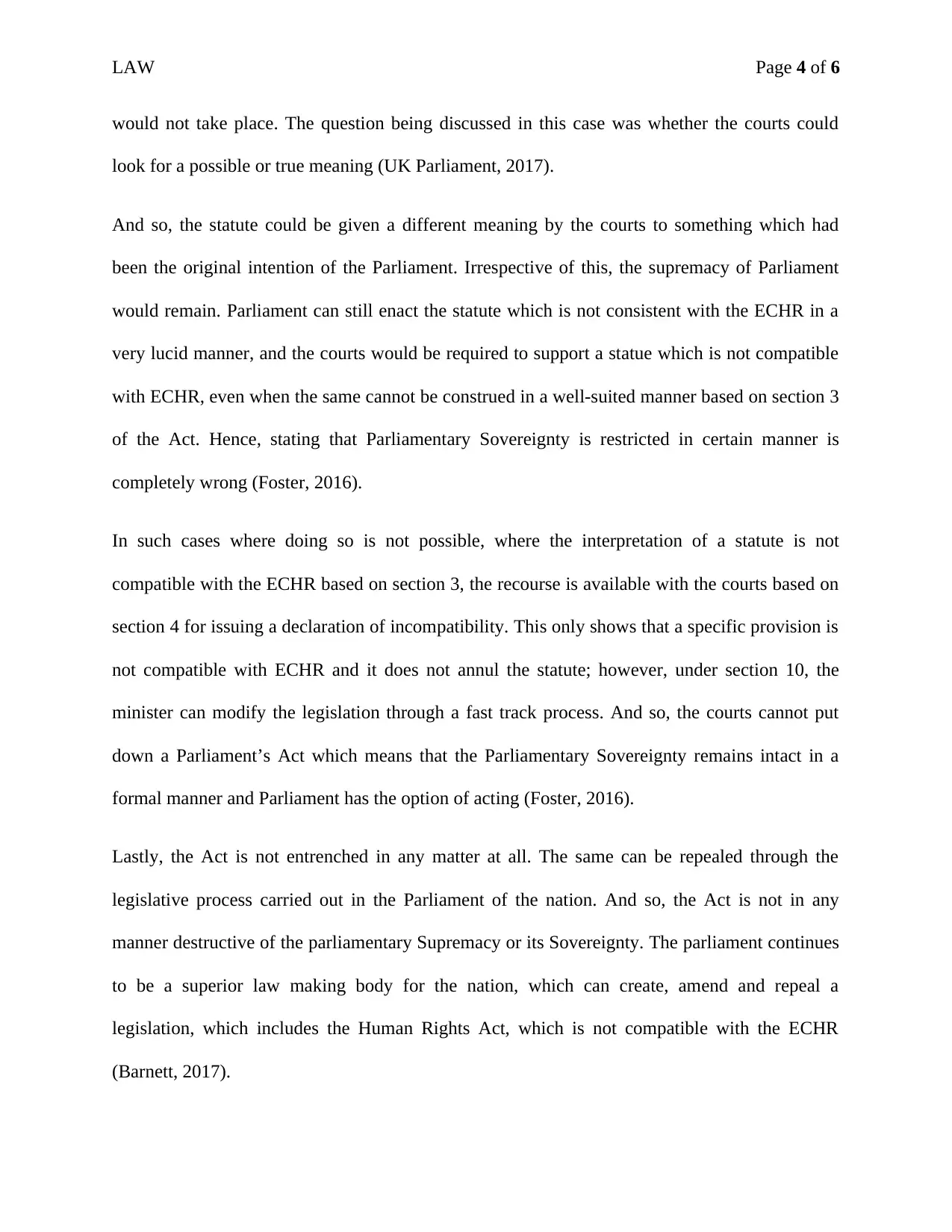
LAW Page 4 of 6
would not take place. The question being discussed in this case was whether the courts could
look for a possible or true meaning (UK Parliament, 2017).
And so, the statute could be given a different meaning by the courts to something which had
been the original intention of the Parliament. Irrespective of this, the supremacy of Parliament
would remain. Parliament can still enact the statute which is not consistent with the ECHR in a
very lucid manner, and the courts would be required to support a statue which is not compatible
with ECHR, even when the same cannot be construed in a well-suited manner based on section 3
of the Act. Hence, stating that Parliamentary Sovereignty is restricted in certain manner is
completely wrong (Foster, 2016).
In such cases where doing so is not possible, where the interpretation of a statute is not
compatible with the ECHR based on section 3, the recourse is available with the courts based on
section 4 for issuing a declaration of incompatibility. This only shows that a specific provision is
not compatible with ECHR and it does not annul the statute; however, under section 10, the
minister can modify the legislation through a fast track process. And so, the courts cannot put
down a Parliament’s Act which means that the Parliamentary Sovereignty remains intact in a
formal manner and Parliament has the option of acting (Foster, 2016).
Lastly, the Act is not entrenched in any matter at all. The same can be repealed through the
legislative process carried out in the Parliament of the nation. And so, the Act is not in any
manner destructive of the parliamentary Supremacy or its Sovereignty. The parliament continues
to be a superior law making body for the nation, which can create, amend and repeal a
legislation, which includes the Human Rights Act, which is not compatible with the ECHR
(Barnett, 2017).
would not take place. The question being discussed in this case was whether the courts could
look for a possible or true meaning (UK Parliament, 2017).
And so, the statute could be given a different meaning by the courts to something which had
been the original intention of the Parliament. Irrespective of this, the supremacy of Parliament
would remain. Parliament can still enact the statute which is not consistent with the ECHR in a
very lucid manner, and the courts would be required to support a statue which is not compatible
with ECHR, even when the same cannot be construed in a well-suited manner based on section 3
of the Act. Hence, stating that Parliamentary Sovereignty is restricted in certain manner is
completely wrong (Foster, 2016).
In such cases where doing so is not possible, where the interpretation of a statute is not
compatible with the ECHR based on section 3, the recourse is available with the courts based on
section 4 for issuing a declaration of incompatibility. This only shows that a specific provision is
not compatible with ECHR and it does not annul the statute; however, under section 10, the
minister can modify the legislation through a fast track process. And so, the courts cannot put
down a Parliament’s Act which means that the Parliamentary Sovereignty remains intact in a
formal manner and Parliament has the option of acting (Foster, 2016).
Lastly, the Act is not entrenched in any matter at all. The same can be repealed through the
legislative process carried out in the Parliament of the nation. And so, the Act is not in any
manner destructive of the parliamentary Supremacy or its Sovereignty. The parliament continues
to be a superior law making body for the nation, which can create, amend and repeal a
legislation, which includes the Human Rights Act, which is not compatible with the ECHR
(Barnett, 2017).
Paraphrase This Document
Need a fresh take? Get an instant paraphrase of this document with our AI Paraphraser
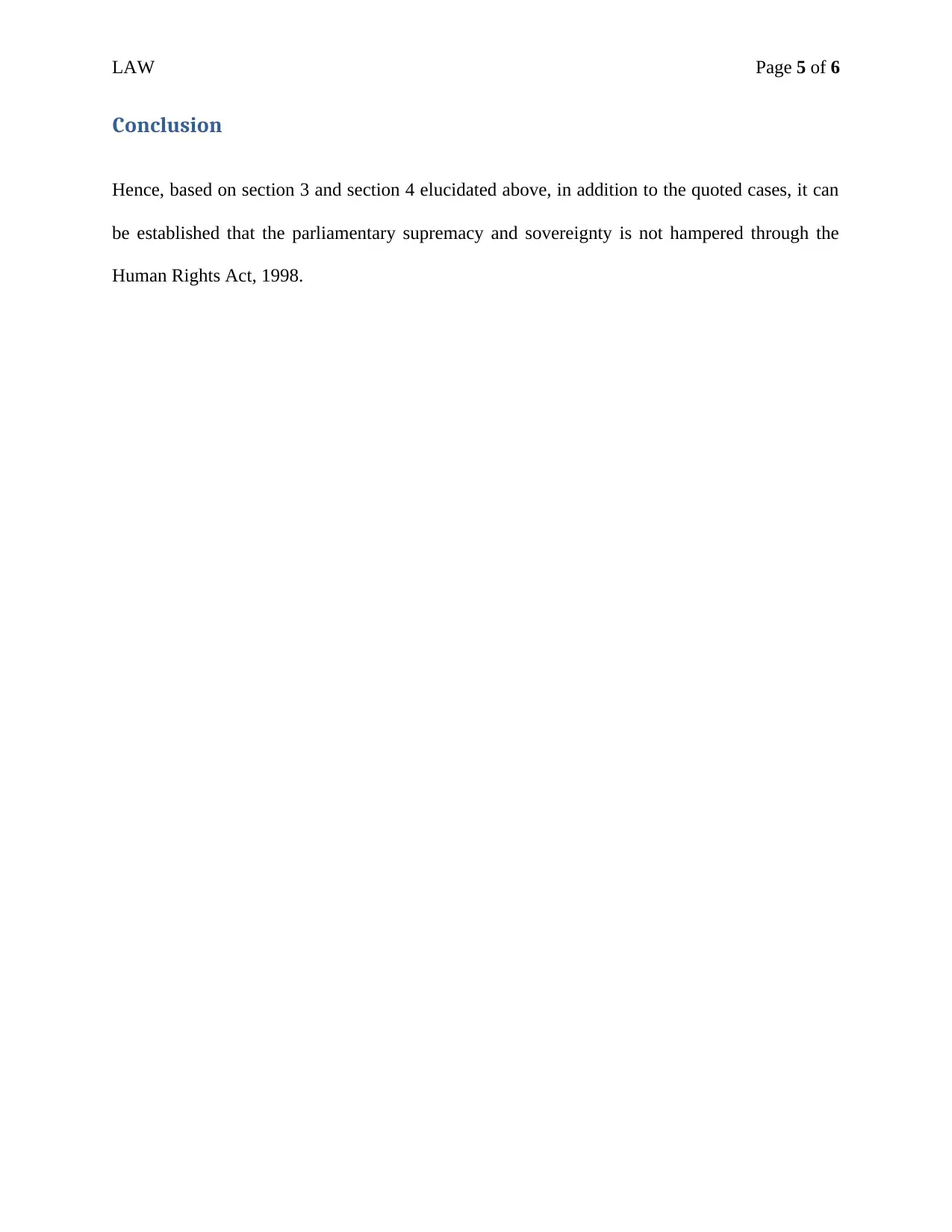
LAW Page 5 of 6
Conclusion
Hence, based on section 3 and section 4 elucidated above, in addition to the quoted cases, it can
be established that the parliamentary supremacy and sovereignty is not hampered through the
Human Rights Act, 1998.
Conclusion
Hence, based on section 3 and section 4 elucidated above, in addition to the quoted cases, it can
be established that the parliamentary supremacy and sovereignty is not hampered through the
Human Rights Act, 1998.
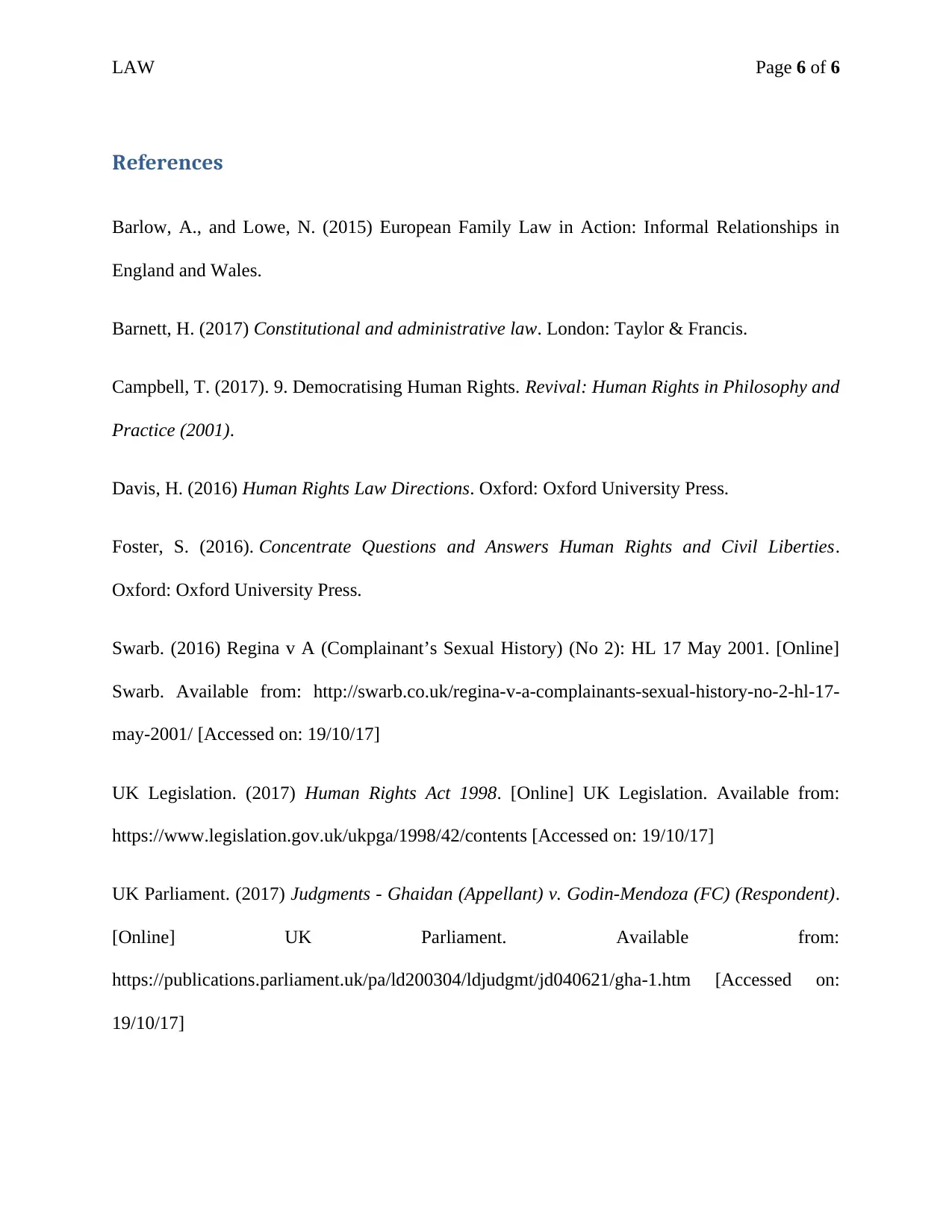
LAW Page 6 of 6
References
Barlow, A., and Lowe, N. (2015) European Family Law in Action: Informal Relationships in
England and Wales.
Barnett, H. (2017) Constitutional and administrative law. London: Taylor & Francis.
Campbell, T. (2017). 9. Democratising Human Rights. Revival: Human Rights in Philosophy and
Practice (2001).
Davis, H. (2016) Human Rights Law Directions. Oxford: Oxford University Press.
Foster, S. (2016). Concentrate Questions and Answers Human Rights and Civil Liberties.
Oxford: Oxford University Press.
Swarb. (2016) Regina v A (Complainant’s Sexual History) (No 2): HL 17 May 2001. [Online]
Swarb. Available from: http://swarb.co.uk/regina-v-a-complainants-sexual-history-no-2-hl-17-
may-2001/ [Accessed on: 19/10/17]
UK Legislation. (2017) Human Rights Act 1998. [Online] UK Legislation. Available from:
https://www.legislation.gov.uk/ukpga/1998/42/contents [Accessed on: 19/10/17]
UK Parliament. (2017) Judgments - Ghaidan (Appellant) v. Godin-Mendoza (FC) (Respondent).
[Online] UK Parliament. Available from:
https://publications.parliament.uk/pa/ld200304/ldjudgmt/jd040621/gha-1.htm [Accessed on:
19/10/17]
References
Barlow, A., and Lowe, N. (2015) European Family Law in Action: Informal Relationships in
England and Wales.
Barnett, H. (2017) Constitutional and administrative law. London: Taylor & Francis.
Campbell, T. (2017). 9. Democratising Human Rights. Revival: Human Rights in Philosophy and
Practice (2001).
Davis, H. (2016) Human Rights Law Directions. Oxford: Oxford University Press.
Foster, S. (2016). Concentrate Questions and Answers Human Rights and Civil Liberties.
Oxford: Oxford University Press.
Swarb. (2016) Regina v A (Complainant’s Sexual History) (No 2): HL 17 May 2001. [Online]
Swarb. Available from: http://swarb.co.uk/regina-v-a-complainants-sexual-history-no-2-hl-17-
may-2001/ [Accessed on: 19/10/17]
UK Legislation. (2017) Human Rights Act 1998. [Online] UK Legislation. Available from:
https://www.legislation.gov.uk/ukpga/1998/42/contents [Accessed on: 19/10/17]
UK Parliament. (2017) Judgments - Ghaidan (Appellant) v. Godin-Mendoza (FC) (Respondent).
[Online] UK Parliament. Available from:
https://publications.parliament.uk/pa/ld200304/ldjudgmt/jd040621/gha-1.htm [Accessed on:
19/10/17]
⊘ This is a preview!⊘
Do you want full access?
Subscribe today to unlock all pages.

Trusted by 1+ million students worldwide
1 out of 6
Related Documents
Your All-in-One AI-Powered Toolkit for Academic Success.
+13062052269
info@desklib.com
Available 24*7 on WhatsApp / Email
![[object Object]](/_next/static/media/star-bottom.7253800d.svg)
Unlock your academic potential
Copyright © 2020–2026 A2Z Services. All Rights Reserved. Developed and managed by ZUCOL.





